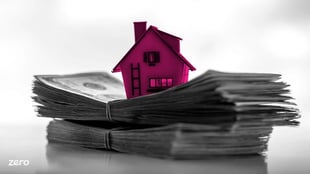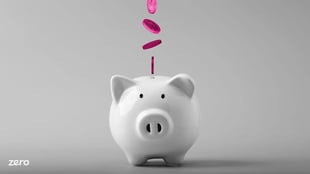Buying a House During COVID-19: A Pandemic’s Impact On Mortgages

There’s no doubt, COVID-19 changed the world in countless ways and took us all by surprise. From an economic standpoint, countless industries were shaken and disrupted. The United States experienced one of the worst economic hardships the country has ever seen
What exactly did COVID-19 do to the homebuying process and mortgage industry, and what’s to come in the future
Buying a new home is tough, so we wrote a blog all about it. Read it now.
At A High Level
Despite the economic uncertainty, the mortgage and real estate market began to soar in 2020 and the powerful upward trajectory continued into 2021. What were the driving forces behind this powerful movement? Also, why did so many people decide to buy a house during the coronavirus pandemic?
There are many variables and layers to unpack in order to understand exactly what happened. These variables can be summarized and categorized into 3 main sections:
- Fear
- Ability
- Finance
Fear: A great deal of fear and uncertainty is associated with the COVID-19 pandemic. This fear ignited a catalyst - people began to leave cities in search of the suburbs as the city was perceived to be the most risky. Relying on public transportation in populated urban areas certainly strays from the advice health experts were encouraging everyone to take to combat this virus.
Ability: Companies transitioned to a working from home culture, while simultaneously schools adapted to remote learning. Instead of one's home or apartment being unoccupied for the majority of the day, the entire family was home trying to get their work done. The lack of space and privacy presented challenges, and families tried to fix those challenges by moving to a larger home with more space.
Finance: Although the economy has a tremendous amount of uncertainty, it was in many people’s financial best interest to purchase a home. Not only does real estate provide less volatility compared to the stock market, the cost to borrow money was also reduced - which we’ll be covering in greater detail below
Mortgage Rates
Mortgage rates, also known as interest rate, is the fee a lender charges for borrowing their money. When one obtains a mortgage, not only is the borrower obligated to pay back the principal balance, they are also obligated to pay back the interest expense.
The higher the interest expense, the more money the borrower has to pay back. The lower the interest expense, the less money the borrower will pay back.
There are various reasons why the federal government lowers interest rates, but at the top of that list is to stimulate economic growth. When the cost of borrowing money is reduced, you’re essentially getting that money ‘on sale’, which encourages more people to borrow and spend. In return, this spending keeps millions of people employed and aids in stabilizing the economy.
According to Freddiemac, the average interest rate on a 30-year fixed rate mortgage went from a 4.46% rate in January of 2019 to 2.74% interest rate in January of 2021. Although that savings looks small, over the lifetime of the loan, this savings adds up!
Here’s a side by side example of how this rate change would impact your monthly mortgage payment.
| January 2019 | January 2021 | |
| Purchase Price | $300,000 | $300,000 |
| Down Payment | $60,000 | $60,000 |
| Interest Rate | 4.46% | 2.74% |
| Monthly Payment | $1,210 | $979 |
As shown above, the borrower would have saved $231 if they were above to finance their home with a 2.74% interest rate instead of a 4.46%. This additional savings can be seen as one driving factor that exacerbated home buyers' desire to buy. So, it can be understood that mortgages issued during COVID-19 saved the borrower quite a bit of money because these mortgages were issued with a lower interest rate
Do you know what the differences are between interest rates and APR? Find out what they are here.
How Coronavirus Affects Housing Supply & Demand
Once you combine the three main variables; fear, ability, and financial, we land on the most foundational economic concept of all - supply and demand. Without question, supply and demand propelled the change in the real estate and mortgage industry. As more people were looking for homes, supply became scarce. This drove home prices higher and higher, ultimately making it easier for a homeowner to part ways with their property and move into another home.
Not only were homeowners getting more for their home when they decided to sell it, the borrower was also borrowing money at a reduced rate.
Following the interest rate example we viewed above, an interest rate of 2.74% saves you quite a bit of money compared to an interest rate of 4.46%. People who previously purchased their home with a higher interest rate decided to refinance their property to reap the benefits. Refinancing your property does not mean you sell your home to someone else. Instead, you simply sell your current mortgage to a lender, who issues you a new mortgage with a lower rate. This lower rate can help keep hundreds, or thousands, of dollars in your pocket each year.
Lending Standards
Although the coronavirus pandemic created a surge in the housing and mortgage industry, this surge came with revisiting the loan standards lenders have. Lenders are only able to lend a certain percentage of their assets. If more and more people are applying for loans, lenders cannot part ways with their entire asset base to satisfy all requests. As a result, some standards are increased to control how much lending a lender actually does.
Borrowers had to meet higher financial standards when they requested a mortgage in 2020 as compared to previous years. One's credit score and debt-to-income ratio was put under an even more watchful eye, and lenders developed a new standard of what they’d accept before issuing the loan.
Our Mortgage Learning Center features blogs on a wide range of mortgage and refinancing topics.
Mortgages: What Does 2022 Have in Store?
Data and forecasts suggest the housing market will continue to be incredibly competitive throughout 2022. As the country still battles the COVID-19 pandemic, and people continue to leave the city and rely less on public transportation, more and more folks will be flocking to the suburbs. Some companies have adapted a ‘you can stay remote’ concept, which gives employees more freedom and flexibility to live where they choose.
In the Market to Buy a Home?
This page last updated: October 11, 2022
Read more on this topic below.

When you buy a house and start making mortgage payments, your payment consists of four different components, known...

If you have gone through the pre-approval process but need to take a deeper dive into how much house to buy,...

The vast majority of mortgage loans require you to put down a certain percentage of the selling price upfront....

Whether you’re a first-time buyer or you’ve purchased a home before, you’ve likely heard of a homeowner’s association....

There’s a lot of expenses to keep in mind when you’re thinking about buying a home. Between the price of the home, property taxes, your mortgage...

Conventional loans are mortgages offered by private lenders, banks, and institutions that are not backed by the government. Unlike FHA, USDA,...

Some homebuyers refuse to purchase a property if it is part of a property owner association. On the...

Research indicates that 58% of homeowners in HOA communities and single-family homes pay an average monthly fee...

Private mortgage insurance is something millions of homeowners pay for each year. However, this type of insurance does not protect

When you first set out to buy a home, it can feel like you’re taking an exam you forgot to study for. You have to make quick...

When looking to refinance or buy a house, the pre-qualified vs pre-approved mortgage debate can be...

It’s likely that your mortgage loan will be the largest loan you have during your lifetime. Mortgages are not a one size...

For many people, owning a home is part of the American dream. To make this dream a reality, most people will take out a...

Whenever you’re looking to buy a house, you’ll quickly realize there are a lot of fees associated with obtaining a mortgage....

A bridge loan is a short-term loan a borrower may use while a more long-term financing contract is finalized. Bridge...

A loan estimate is crucial to obtain when looking for a loan. This estimate not only gives you the details of a mortgage but also compares offers...

There are many moving parts and various people you’ll deal with throughout the homebuying process....

If you’re looking to buy a house, and do not have a mountain of cash saved up, you’ll need to consider getting a mortgage to help you finance this...

If you find a property that you’re highly interested in buying but are concerned that the seller might choose...

Buying a home? You’ll likely need to get it appraised before you receive the clear to close. If you’re wondering...

If you’re an active service member, a veteran, or the surviving spouse of a veteran, and you want to ...

Whenever you are borrowing money, whether it’s for a new mortgage, a refinance, credit card, or car loan, you’ll hear...

If you’re new to buying a home, you probably have quickly realized the overwhelming amount of options there...

If you’ve already gone through the lengthy process of writing offers, securing financing, and arranging inspections for your...

One of the most important steps to buying a home is deciding on a mortgage loan and deciding on a loan involves settling on a good...

First time home buyers are often surprised when they learn about all of the expenses that are associated with ...

Purchasing real estate is not as simple as finding the right home, submitting an offer, and signing the closing paperwork; many...
